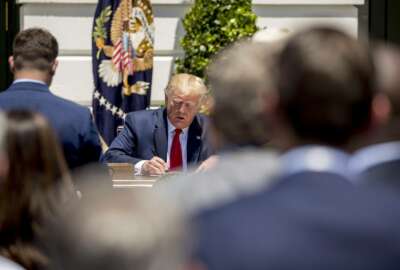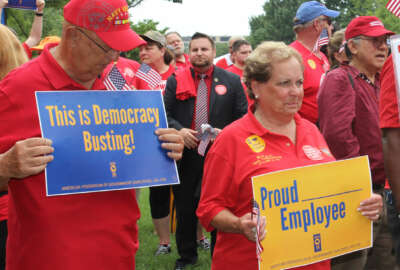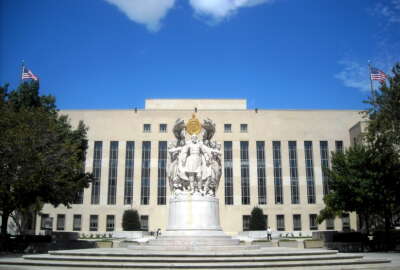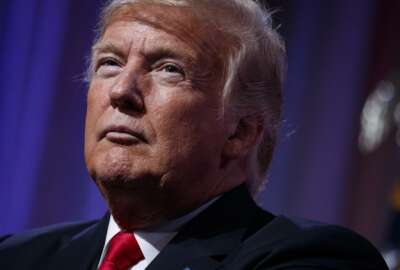
Unions plot next steps on Trump workforce executive orders
The U.S. Court of Appeals for the D.C. Circuit overturned a lower court's decision on the President's workforce executive orders, but it also delayed lifting the...
This week’s decision by the U.S. Court of Appeals was immediately viewed as a win for the Trump administration in its effort to enforce the provisions of the President’s three workforce executive orders.
A three-judge panel on the U.S. Court of Appeals for the District of Columbia Circuit on Tuesday overturned an August 2018 decision from a federal district court, which had initially invalidated nine key provisions of the President’s executive orders on collective bargaining and official time.
But federal employee unions, which as a group sued the Trump administration over the workforce EOs last summer, have a legal path to challenge that decision.
The appeals court hasn’t formally lifted the injunction on the President’s workforce executive orders, and agencies can’t immediately rush to implement the terms of the EOs, if they haven’t already.
“It is ordered, on the court’s own motion, that the clerk withhold issuance of the mandate herein until seven days after disposition of any timely petition for rehearing or petition for rehearing en blanc,” an order from the appeals judges reads. “This instruction to the clerk is without prejudice to the right of any party to move for expedited issuance of the mandate for good cause shown.”
The ruling appears to give federal employee unions some time to challenge the decision from the three-judge panel, which the American Federation of Government Employees, National Treasury Employees Union and other plaintiffs on the case have said they will do.
Federal employee unions could ask for a rehearing or seek review before a full appeals court. They could also bring the case before the Supreme Court.
“Our legal teams are looking at reviewing this now,” Paul Shearon, president of the International Federation of Professional and Technical Engineers, told reporters Tuesday. “This is going to be tied up in a legal morass for a significant period of time as a result of what is currently happening. I wouldn’t be surprised if there is an appeal for a review by an 11-judge panel as possibly the next step. We’ll have to wait and see.”
The appeals judges didn’t challenge the provisions of the workforce executive orders and didn’t rule on the validity of the EOs as a whole, a point that federal employee unions will likely draw on during their next legal steps.
The appeals court overturned the August district court decision because, as the judges argued, the lower court lacked jurisdiction in ruling on the unions’ case to begin with.
“It’s important to understand that the Court of Appeals did not rule on the merits of the case, merely on the issue of jurisdiction,” Randy Erwin, president of the National Federation of Federal Employees, told reporters Tuesday. “The Trump administration didn’t get a stamp of approval here.”
Meanwhile, unions have asked Congress for help in pursuing legislative workarounds to the President’s workforce executive orders.
The International Association of Machinists and Aerospace Workers, another one of the case’s plaintiffs, on Thursday asked House members to consider how they could help federal employee unions combat the implementation of the President’s workforce executive orders.
“[We seek] your support in pursuing legislative remedies to block and reverse these destructive executive orders,” Robert Martinez, president of the association, wrote in a letter to House members.
Still, unions have said they’re still seeing the impacts of the workforce executive orders, regardless of any court ruling.
Both AFGE and NTEU have said various agencies have made proposals in recent collective bargaining negotiations that largely mirror portions of the president’s workforce executive orders. The Department of Veterans Affairs has limited official time for some 104,000 medical professionals within the agency, and it’s currently pursuing additional limits in its bargaining negotiations with AFGE.
The Department of Health and Human Services, after the Federal Service Impasses Panel largely ruled in its favor, can begin to charge NTEU rent for the use of office space or other supplies.
Other agencies, including the Education Department, Environmental Protection Agency and Social Security Administration, either are pursuing or have already imposed new policies that reflect the executive orders and their ideas.
Unions have filed unfair labor practice (ULP) complaints with the FLRA over these matters, but the agency still lacks a general counsel. Only the FLRA general counsel can issue decisions on those ULP complaints.
The President’s nominee to fill that position, Catherine Bird, testified before the Senate Homeland Security and Governmental Affairs Committee this week, where she suggested she may handle unfair labor practice complaints in a different manner than she would as a member of an agency negotiating team.
Both NTEU and AFGE wrote to the committee ahead of Bird’s nomination hearing and expressed their opposition, referencing their interactions with her at collective bargaining negotiations at the departments of Veterans Affairs and Health and Human Services.
“My duty was to represent management to the best of my ability at that negotiations table, which is what I did,” she said when asked about her role in HHS’ collective bargaining negotiations with NTEU. “My role and my duty as general counsel of the FLRA would be to be an impartial decision maker. I can commit to look at the facts of each case, apply the applicable rules and regulations to the individual facts in that case and come to an impartial and a fair decision.”
Copyright © 2025 Federal News Network. All rights reserved. This website is not intended for users located within the European Economic Area.
Nicole Ogrysko is a reporter for Federal News Network focusing on the federal workforce and federal pay and benefits.
Follow @nogryskoWFED
Related Stories






